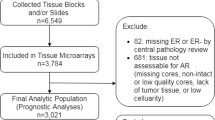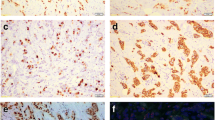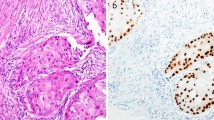Abstract
The aim was to investigate the implications of androgen receptor (AR) expression levels on outcomes for estrogen receptor (ER)-positive tumors. Immunohistochemically AR levels were determined from tissue microarrays of 614 ER-positive patients who received adjuvant endocrine with or without chemotherapy between November 1999 and August 2005. Characteristics and survival were analyzed using a Chi-square test, Kaplan–Meier methods, and Cox’s models. AR levels were categorized into 3 subgroups as follows: low, AR < 10%; intermediate, 10% ≤ AR < 50%; high, AR ≥ 50%. Low, intermediate, and high AR levels were observed in 29.0, 44.0, and 27.0% of patients, respectively. High AR was associated with smaller size, nodal uninvolvement, grade I/II tumor, higher progesterone receptor expression, and lower proliferation index. With a median follow-up of 70.9 months, the high AR subgroup showed better survival, and these associations were maintained in 119 patients who received endocrine therapy alone [hazard ratio (HR), 0.111; 95% CI, 0.013–0.961 for disease-free survival (DFS); HR, 0.135; 95% CI, 0.015–1.208 for overall survival (OS)]. No significant benefits from chemotherapy were demonstrated in the high AR subgroup; however, the benefit from chemotherapy was significant among 448 AR-intermediate or -low patients (HR, 2.679; 95% CI, 1.452–4.944 for DFS; HR, 3.371; 95% CI, 1.611–7.052 for OS). High AR is an independent prognostic factor and a significant predictor for better endocrine-responsiveness in ER-positive tumors. AR-low or -intermediate levels could give an additional indication for use of chemotherapy in ER-positive tumors.



Similar content being viewed by others
Abbreviations
- AIs:
-
Aromatase inhibitors
- ANOVA:
-
Analysis of variance
- AR:
-
Androgen receptor
- ASCO/CAP:
-
American Society of Clinical Oncology/College of American Pathologists
- CMF:
-
Cyclophosphamide, methotrexate, and fluorouracil
- DAPI:
-
4′,6-diamidino-2-phenylindole
- DFS:
-
Disease-free survival
- ER:
-
Estrogen receptor
- FISH:
-
Fluorescence in situ hybridization
- H&E:
-
Hematoxylin and eosin
- HER2:
-
Human epidermal growth factor receptor 2
- HR:
-
Hazard ratio
- IHC:
-
Immunohistochemistry
- NCCN:
-
National Comprehensive Cancer Network
- OS:
-
Overall survival
- SERMs:
-
Selective estrogen receptor modulators
- STROBE:
-
Strengthening the reporting of observational studies in epidemiology
- TMA:
-
Tissue microarray
References
Early Breast Cancer Trialists’ Collaborative Group (EBCTCG) (2005) Effects of chemotherapy and hormonal therapy for early breast cancer on recurrence and 15-year survival: an overview of the randomised trials. Lancet 365:1687–1717. doi:10.1016/S0140-6736(05)66544-0
Bedard PL, Freedman OC, Howell A et al (2008) Overcoming endocrine resistance in breast cancer: are signal transduction inhibitors the answer? Breast Cancer Res Treat 108:307–317. doi:10.1007/s10549-007-9606-8
Ma CX, Sanchez CG, Ellis MJ (2009) Predicting endocrine therapy responsiveness in breast cancer. Oncology (Williston Park) 23:133–142
Harvey JM, Clark GM, Osborne CK et al (1999) Estrogen receptor status by immunohistochemistry is superior to the ligand-binding assay for predicting response to adjuvant endocrine therapy in breast cancer. J Clin Oncol 17:1474–1481
Cui X, Schiff R, Arpino G et al (2005) Biology of progesterone receptor loss in breast cancer and its implications for endocrine therapy. J Clin Oncol 23:7721–7735. doi:10.1200/JCO.2005.09.004
Paik S, Shak S, Tang G et al (2004) A multigene assay to predict recurrence of tamoxifen-treated, node-negative breast cancer. N Engl J Med 351:2817–2826. doi:10.1056/NEJMoa041588
van de Vijver MJ, He YD, van’t Veer LJ et al (2002) A gene-expression signature as a predictor of survival in breast cancer. N Engl J Med 347:1999–2009. doi:10.1056/NEJMoa021967
Berry DA, Cirrincione C, Henderson IC et al (2006) Estrogen-receptor status and outcomes of modern chemotherapy for patients with node-positive breast cancer. JAMA 295:1658–1667. doi:10.1001/jama.295.14.1658
Montemurro F, Aglietta M (2009) Hormone receptor-positive early breast cancer: controversies in the use of adjuvant chemotherapy. Endocr Relat Cancer 16:1091–1102. doi:10.1677/ERC-09-0033
Colleoni M, Bagnardi V, Rotmensz N et al (2009) Increasing steroid hormone receptors expression defines breast cancer subtypes non responsive to preoperative chemotherapy. Breast Cancer Res Treat 116:359–369. doi:10.1007/s10549-008-0223-y
Carlson RW, Allred DC, Anderson BO et al (2009) Breast cancer. Clinical practice guidelines in oncology. J Natl Compr Cancer Netw 7:122–192
Goldhirsch A, Ingle JN, Gelber RD et al (2009) Thresholds for therapies: highlights of the St Gallen International Expert Consensus on the primary therapy of early breast cancer 2009. Ann Oncol 20:1319–1329. doi:10.1093/annonc/mdp322
Park S, Koo JS, Kim MS et al (2011) Androgen receptor expression is significantly associated with better outcomes in estrogen receptor-positive breast cancers. Ann Oncol 22:1755–1762. doi:10.1093/annonc/mdq678
Castellano I, Allia E, Accortanzo V et al (2010) Androgen receptor expression is a significant prognostic factor in estrogen receptor positive breast cancers. Breast Cancer Res Treat 124:607–617. doi:10.1007/s10549-010-0761-y
Agoff SN, Swanson PE, Linden H et al (2003) Androgen receptor expression in estrogen receptor-negative breast cancer. Immunohistochemical, clinical, and prognostic associations. Am J Clin Pathol 120:725–731. doi:10.1309/42F0-0D0D-JD0J-5EDT
Hu R, Dawood S, Holmes MD et al (2011) Androgen receptor expression and breast cancer survival in postmenopausal women. Clin Cancer Res 17:1867–1874. doi:10.1158/1078-0432.CCR-10-2021
Park S, Koo J, Park HS et al (2010) Expression of androgen receptors in primary breast cancer. Ann Oncol 21:488–492. doi:10.1093/annonc/mdp510
Ingle JN, Twito DI, Schaid DJ et al (1991) Combination hormonal therapy with tamoxifen plus fluoxymesterone versus tamoxifen alone in postmenopausal women with metastatic breast cancer. An updated analysis. Cancer 67:886–891
Macedo LF, Guo Z, Tilghman SL et al (2006) Role of androgens on MCF-7 breast cancer cell growth and on the inhibitory effect of letrozole. Cancer Res 66:7775–7782. doi:10.1158/0008-5472.CAN-05-3984
De Amicis F, Thirugnansampanthan J, Cui Y et al (2010) Androgen receptor overexpression induces tamoxifen resistance in human breast cancer cells. Breast Cancer Res Treat 121:1–11. doi:10.1007/s10549-009-0436-8
von Elm E, Altman DG, Egger M et al (2007) The strengthening the reporting of observational studies in epidemiology (STROBE) statement: guidelines for reporting observational studies. Lancet 370:1453–1457. doi:10.1016/S0140-6736(07)61602-X
Greene FL, Page DL, Fleming ID et al (2002) AJCC cancer staging manual, 6th edn. Springer, New York
Elston CW, Ellis IO (1991) Pathological prognostic factors in breast cancer. I. The value of histological grade in breast cancer: experience from a large study with long-term follow-up. Histopathology 19:403–410
Hammond ME, Hayes DF, Dowsett M et al (2010) American society of clinical oncology/College of American Pathologists guideline recommendations for immunohistochemical testing of estrogen and progesterone receptors in breast cancer. J Clin Oncol 28:2784–2795. doi:10.1200/JCO.2009.25.6529
Wolff AC, Hammond ME, Schwartz JN et al (2007) American society of clinical oncology/College of American pathologists guideline recommendations for human epidermal growth factor receptor 2 testing in breast cancer. J Clin Oncol 25:118–145. doi:10.1200/JCO.2006.09.2775
Rastelli F, Crispino S (2008) Factors predictive of response to hormone therapy in breast cancer. Tumori 94:370–383
Cleator SJ, Ahamed E, Coombes RC et al (2009) A 2009 update on the treatment of patients with hormone receptor-positive breast cancer. Clin Breast Cancer 9:S6–S17. doi:10.3816/CBC.2009.s.001
Moe RE, Anderson BO (2007) Androgens and androgen receptors: a clinically neglected sector in breast cancer biology. J Surg Oncol 95:437–439. doi:10.1002/jso.20722
Yu Q, Niu Y, Liu N et al (2011) Expression of androgen receptor in breast cancer and its significance as a prognostic factor. Ann Oncol 22:1288–1294. doi:10.1093/annonc/mdq586
Loibl S, Muller BM, von Minckwitz G et al (2011) Androgen receptor expression in primary breast cancer and its predictive and prognostic value in patients treated with neoadjuvant chemotherapy. Breast Cancer Res Treat 130:477–487. doi:10.1007/s10549-011-1715-8
Ravdin PM, Siminoff LA, Davis GJ et al (2001) Computer program to assist in making decisions about adjuvant therapy for women with early breast cancer. J Clin Oncol 19:980–991
Chen LL, Nolan ME, Silverstein MJ et al (2009) The impact of primary tumor size, lymph node status, and other prognostic factors on the risk of cancer death. Cancer 115:5071–5083. doi:10.1002/cncr.24565
Koo JS, Jung W, Jeong J (2009) The predictive role of E-cadherin and androgen receptor on in vitro chemosensitivity in triple-negative breast Cancer. Jpn J Clin Oncol 39:560–568. doi:10.1093/jjco/hyp065
Acknowledgments
The author(s) indicate no potential conflicts of interest. A major part of this study was presented at the Sixth International Symposium on Hormonal Oncogenesis, Poster Presentations, September 12–16, 2010 in Tokyo, Japan. This study was supported by the Brain Korea 21 Project for Medical Science, Yonsei University, and in part by a grant-in-aid from Sanofi-Aventis Pharmaceutical Co. and Dong-A Pharmaceutical Co.
Author information
Authors and Affiliations
Corresponding author
Rights and permissions
About this article
Cite this article
Park, S., Park, H.S., Koo, J.S. et al. Higher expression of androgen receptor is a significant predictor for better endocrine-responsiveness in estrogen receptor-positive breast cancers. Breast Cancer Res Treat 133, 311–320 (2012). https://doi.org/10.1007/s10549-011-1950-z
Received:
Accepted:
Published:
Issue Date:
DOI: https://doi.org/10.1007/s10549-011-1950-z




